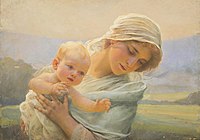Yunus Emre
Appearance

Each passing day fans and rouses my flame,
What I desire in both worlds is the same:
You're the one I need, you're the one I crave.
Yunus Emre (1238–1328) was a Turkish folk poet and Islamic Sufi mystic who greatly influenced Turkish culture. His name, Yunus, is the Muslim equivalent to the English name Jonah. He wrote in Old Anatolian Turkish, an early stage of Turkish.

Day and night do I burn; Thou, Thou art needed by me.
Were they to slay me, let them winnow my ashes into the heavens.
There let my dust cry, "Thou, Thou art needed by me."

Let me render my heart a slave, it may happen that I join the beloved.
Quotes
[edit]Poetry
[edit]- Yunus'dur benim adım
Gün geçtikçe artar odum
İki cihanda maksûdum
Bana seni gerek seni. - translation:
- My name is Yunus,
Each passing day fans and rouses my flame,
What I desire in both worlds is the same:
You're the one I need, you're the one I crave- The Poetry of Yūnus Emre, A Turkish Sufi Poet, p. 124
- Işkun aldî benden beni bana seni gerek seni
Ben yanaram düni güni bana seni gerek seni.
Eğer beni öldüreler külüm göke savuralar
Toprağîm anda çağîra bana seni gerek seni. - translation:
- Thy love hath taken me from me; Thou, Thou art needed by me.
Day and night do I burn; Thou, Thou art needed by me.
Were they to slay me, let them winnow my ashes into the heavens.
There let my dust cry, "Thou, Thou art needed by me."- Divan Yunus, p. 132, also quoted in The Concept of Love In Yunus Emre's Thought, Chapter 1, p. 23
- İki kişi söyleşür Yunus i görsem diyü
Biri aydur ben gördüm bir aşik kocaimiş. - translation:
- Two Persons talk, saying "Would that I see Yunus
One [of them] says, "I saw, he is [only] an eminent lover.- Divan Yunus, p. 330, also quoted in The Concept of Love In Yunus Emre's Thought, p. 75
- Aşîk oldum şoy ay yüze nizar oldum bal ağîza
Nazar kîldîm kara göze siyah olun kaşa geldim. - translation:
- I fell in love with this moon-face: Lavishly I am scattered on the honeymouth
I glanced at the black eye; being black I landed on the eyebrow.- Divan Yunus, p. 213, also quoted in The Concept of Love In Yunus Emre's Thought, p. 24 & p. 75.
- Aşîklarîn gönlü gözü maşuk dapa gitmiş olur
Ben gönlümü kul eyleyem başed ki maşuka irem. - translation:
- Lover's heart and eye will have gone toward the beloved.
Let me render my heart a slave, it may happen that I join the beloved.- Yunus Emre ve Tasavvuf, p. 91, also quoted in The Concept of Love In Yunus Emre's Thought, Chapter 1, p. 18
- Ben be mülke garib geldün ben bu ilden bizerem
Bu dutsaklîk Tuzağîn demi geldi üzerem. - translation:
- I came to this world (as a ) stranger, I am tried of this land.
The time has come that I break this trap of enslavement.- Divan Yunus, p. 200, also quoted in The Concept of Love In Yunus Emre's Thought, p. 84
External links
[edit]- Abdülbaki Gölpînarlî: Yunus Emre ve Tasavvuf, İstanbul, 1961.
- A. Ruşen Sezer: The Concept of Love In Yunus Emre's Thought, Institute of Islamic Studies, McGill University, Montreal, Canada, August 1967.
- Grace Martin Smith: The Poetry of Yunus Emre, A Turkish Sufi Poet, Berkeley and Los Angeles: University of California Press, 1993.


